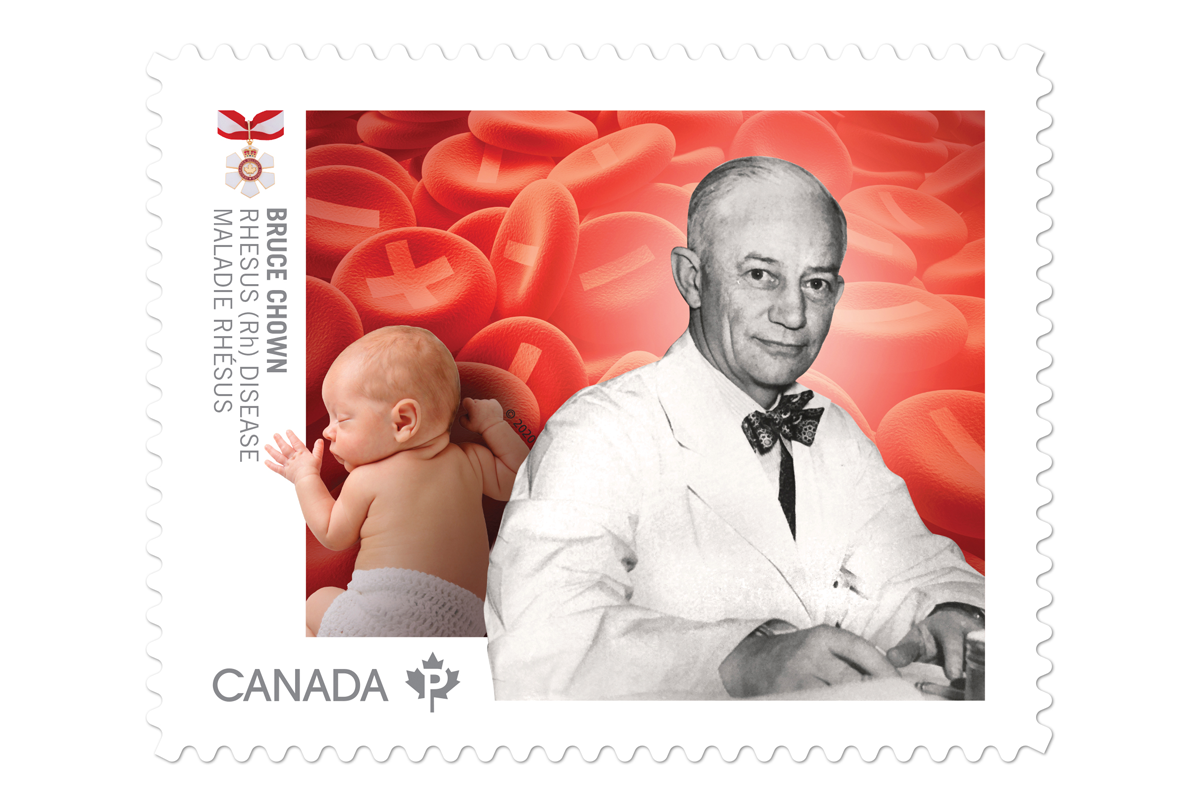
Canada Post is celebrating Dr. Bruce Chown’s groundbreaking research by featuring him on a commemorative stamp.
New stamp honours health pioneer Dr. Bruce Chown
University of Manitoba alumnus Henry Bruce Chown [MD/22] is one of six groundbreaking physicians and researchers being celebrated across the country this week with the unveiling of a set of commemorative Canada Post stamps.
The renowned researcher and a former UM professor is internationally recognized for leading the way in eliminating the once-deadly rhesus (Rh) disease, a condition that may occur when the Rh blood types of a pregnant woman and her fetus are incompatible. The disease was once a major cause of newborn deaths.
“This honour is a fitting way of celebrating Dr. Bruce Chown’s groundbreaking research,” said Dr. Brian Postl, dean, Rady Faculty of Health Sciences and vice-provost (Health Sciences.) “He was a pioneer in his field and his work virtually eliminated infant deaths from Rh disease.”
The stamp featuring Chown was designed by Mike Savage and Dale Kilian at Signals in Vancouver. The background features a baby and an image of human blood cells marked with plus and minus signs, representing cells with (+) and without (-) the Rh factor.
The University of Manitoba College of Medicine Archives in the Neil John Maclean Health Sciences Library supplied Canada Post with the photograph of Chown that is featured on the stamp. Photos from the College of Medicine Archives were also used in Canada Post’s video promoting the new stamp.
“Dr. Chown and his fellow researchers being honoured spent their careers working on innovative advancements in health care,” Postl said. “These stamps are an excellent way for Canadians to learn about the world-class research that took place here in Manitoba and across the country.”
The four other Canada Post stamps feature Drs. Julio Montaner, Balfour Mount, M. Vera Peters, James Till and Ernest McCulloch. Their contributions to the fields of HIV/AIDS, palliative care, oncology and stem cell science transformed the practice of medicine in Canada and around the world.
Chown was born in Winnipeg in 1893. After receiving his BA at McGill University in 1914, he served in the Canadian Army from 1915 to 1919. Following the First World War, Chown returned to his hometown and entered medical school at the University of Manitoba.
After graduating with his MD in 1922, he headed to the United States and trained in pediatrics from 1922 to 1926 at Columbia University, Johns Hopkins University and Cornell University.
Chown returned to Winnipeg and joined the Children’s Hospital as a pathologist and took on several teaching and administrative positions which included professor and head of the department of pediatrics at UM. In 1944, Chown established the Winnipeg Rh Laboratory and focused his research on Rh hemolytic disease of the newborn. He led a team which was responsible for the development and licensing of the Rh immunoglobulin in 1968, a protein injection for mothers-to-be which has saved the lives of hundreds of thousands of babies around the globe.
He has been called “a true giant in the overlapping fields of pediatrics, obstetrics, hematology and blood banking” who virtually eradicated the scourge of Rh incompatibility.
He has been honoured for his vital contributions many times including by the University of Manitoba when he received an honorary Doctor of Science in 1963.
In 1968, he was presented with the Order of Canada for his outstanding life’s work and was inducted into the Canadian Medical Hall of Fame in 1995 where he was remembered as “an expert clinician, diagnostician, innovator and teacher.”
The University of Manitoba paid tribute to the memory of Dr. Chown through the unveiling of a commemorative bust at Innovation Plaza in 2016 where he was celebrated as a remarkable individual. The Winnipeg Rh Institute Foundation, Inc. was the sponsor of the commemorative bust of Chown. Winnipeg Rh Institute was established in 1944 with Dr. Chown as director through to 1972.
Henry Bruce Chown passed away in Victoria, B.C. in 1986.







Great article. Very informative. fitting tribute to have Dr Chown honored with a stamp.
WHAT A DELIGHTFUL ARTICLE YOU HAVE WRITTEN. MANY THANKS. I MET MY COUSIN DR. CHOWN WHEN HE AND HIS WIFE MOVED TO VICTORIA FOR RETIREMENT MANY YEARS AGO. WHAT A FINE MAN FOR SURE. SINCERELY, ROBERT
I was his Red Cell donor for many years.